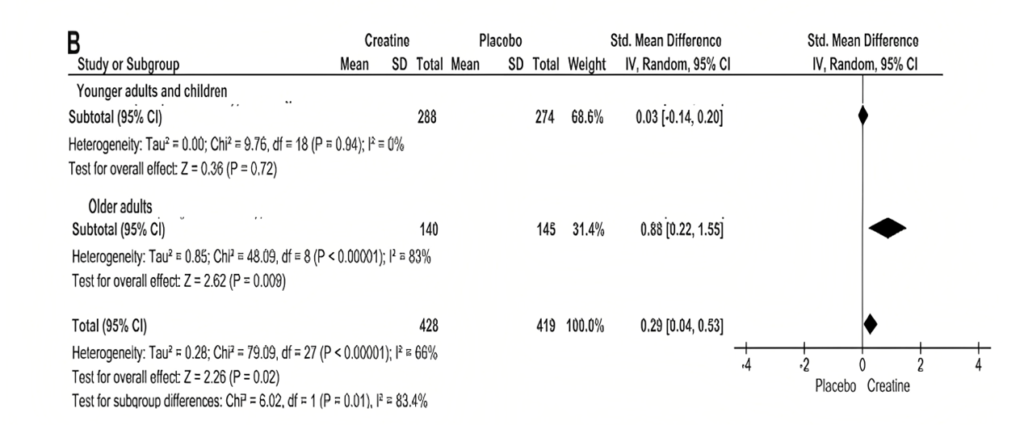Researchers Reveal that Creatine Enhances Memory
Creatine – a commonly used workout supplement – has been shown to enhance memory performance in healthy adults, particularly among seniors.
Highlights:
- Creatine treatment improved memory as compared to placebo across 10 studies worldwide.
- Subgroup analysis showed that memory improvement was more significant in seniors than in younger individuals.
- Treatment duration and gender did not influence the results.
Creatine is often used as a supplement either shortly before or immediately after exercise to help increase strength and improve physical performance. It is necessary for energy production and is used to make adenosine triphosphate (ATP), the main energy molecule in the body. It can be obtained from one’s diet but is also made in the liver, kidneys, and brain. Despite its fame in being an exercise supplement, multiple studies have also shown that it can be beneficial for brain health, especially memory improvement.
A recent meta-analysis – a process used to merge and understand multiple studies – published in Nutrition Reviews, evaluated the multiple studies used to determine the effectiveness of creatine use for memory performance. Supplementing with creatine has been shown to increase brain creatine, which helps provide faster energy and helps maintain energy production in the mitochondria (the cell’s powerhouse). Memory – the ability to process and retain information – consumes a lot of energy, and thus creatine supplementation for memory has been under study. After looking at multiple studies, the researchers found that, overall, creatine supplementation improved memory as compared to placebo. Analyzing by subgroup showed that older adults had significant memory improvement as compared to younger adults. Additionally, the duration of treatment and gender did not seem to influence the results.
“This systematic review and meta-analysis revealed that creatine monohydrate supplementation has a beneficial effect on memory performance in healthy individuals,” the scientists wrote.
Creatine Helps with Memory in Older Adults
The researchers looked at 10 different randomized controlled trials – in which participants are randomly selected for treatment or placebo to help minimize bias when investigating a new treatment – covering 225 participants, split between placebo and treatment. The studies were conducted around the world – in the United Kingdom, New Zealand, Brazil, and the United States – as well as in both sexes and across various age ranges. The minimum length of creatine supplementation was 5 days, and the maximum was 24 weeks, with a slew of time points in between. A majority of the studies, 70%, used 20 grams of creatine, while one used 5 grams, one used 3 grams, and one used 2.2 grams. Most used creatine monohydrate in powder form, and one used encapsulated creatine.
The investigators used a variety of memory assessment tools, which asked participants to recall numbers, letters, or block sequences after having some time to memorize them. They found that memory performance improved with creatine use.

Prokopidis and colleagues also looked at subgroup analysis, separating the study groups by age, dosage, treatment duration, and gender. By doing so, they found that creatine was not associated with memory improvements in younger individuals (ages 11-31), but rather only in older adults (ages 66-76). Furthermore, higher doses of creatine – above 5 grams – did not lead to increased memory improvement. Neither treatment duration nor gender affected results.

Creatine for Brain Health
Prokopidis and colleagues show here that across 10 placebo-controlled studies, there seems to be memory improvement when healthy individuals are given creatine, especially among older individuals. The researchers do mention that there is some risk of bias given that over half of the studies lacked information on how their randomization was applied; however, despite the need for caution because of this, this meta-analysis points towards creatine being effective for memory improvement and highlights a need for larger clinical trials addressing creatine’s benefits for memory improvement and possible benefits for other aspects of brain health.
Previous research has shown that creatine may decline with age, and those with lower creatine levels may have a more robust response to supplementation, meaning seniors with lower creatine levels show more memory improvement when supplemented because their baseline levels are low. Other research groups have also performed analyses of the current creatine research and reached similar conclusions, that aged or stressed individuals may have greater benefit from creatine supplementation than other groups. Additionally, individual studies done in older adults showed that creatine does help with memory recall, but more studies with long-term follow-up are needed.
Additionally, many of the creatine studies featured in the meta-analyses lack baseline measurements – measurements of creatine levels prior to starting supplementation. Despite the fact that more research is needed, creatine has relatively few side effects and has a host of benefits. As always, speak to your healthcare provider before starting or stopping any medications or supplements.
Model: Healthy aged adults
Dosage: 20, 5, 3, or 2.2 mg creatine monohydrate

